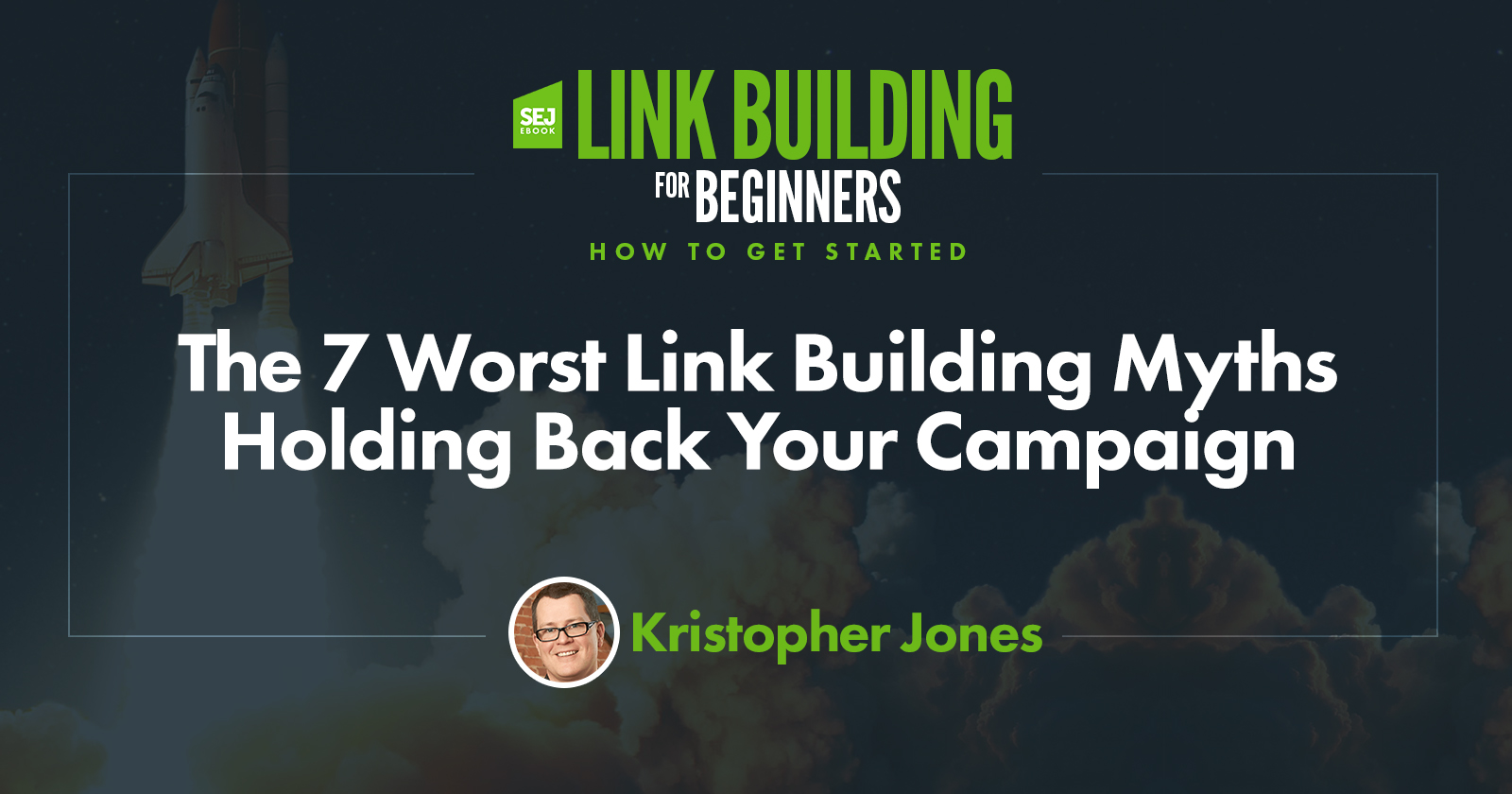As long as search engines shroud their algorithms in secrecy, the industry will continue to be rife with spam and myths.
I’d argue this encourages businesses to pursue the wrong strategies rather than strategies that work.
That’s why some people have lost faith in the value of SEO. This limits opportunities more than it creates new ones.
As you read through this chapter, you’ll notice a number of popular myths that cast a negative light on link building and leave people scared of pursuing manual link building practices.
This is understandable from where the industry has come from.
You’ve likely heard or read advice from link building experts like, “it’s no longer 2006!” and “link building should be completely natural.”
But I’d argue that this leaves us blind to good link building opportunities.
Do search engines justify links by their ends (value) or by their means (practice)? I’d argue the latter.
But the point here isn’t to argue ethics. It’s to showcase value.
Here I’d like to dispel seven popular myths and misconceptions about link building that are causing more harm than good.
Once we’ve busted these myths, we can deliver our clients more value by better understanding the core basics of link building.
Myth 1: Backlinks Are a ‘Top’ Google Ranking Factor
This myth dates back to a Google Q&A, when Google Search Quality Senior Strategist Andrey Lipattsev stated that links, content, and RankBrain were Google’s top three ranking factors.
But if this were true, it would ignore a vast majority of signals, such as user experience, query intent, and hundreds of other ranking factors to prioritize pages by the amount of backlinks they have.
John Mueller even clarified this.
Google’s ranking factors are dynamic, employing different algorithms when determining the results of different queries for different user intent.
But countless correlation studies have shown that pages in the top three results tend to have an huge number of backlinks.
The question is:
Do these pages rank high because of their backlink profile – or do they have so many backlinks because they are ranking high?
It’s all relative.
Would a Position 4 result with more twice as many clicks eventually overthrow a Position 2 piece of content with twice as many backlinks? How do Google and Bing weigh these different considerations against each other?
We don’t know. So we shouldn’t limit our strategy.
Does this mean that backlinks aren’t an important ranking signal?
Of course not.
The influence of links may be more substantial in first-page search results when most other factors remain equal.
Myth 2: The Penguin Penalty
Penguin is an algorithm, not a penalty handed out by Google.
The distinction is important for two reasons.
- Google won’t warn you when your site is devalued because of its backlink profile.
- Recovery from an algorithmic devaluation offers simpler solutions.
Despite promises from Google that Penguin 4.0 does not trigger negative sitewide ranking actions, countless case studies have proven differently.
Check out these case studies here and here for more proof.
Recovering from negative SEO caused by spammy link building only requires disavowing those links that qualify as obvious spam.
Generally, you shouldn’t worry about Penguin if you’re pursuing good linking strategies and avoiding links farms and networks.
Even if Penguin does catch some malicious links, which every site has, then I still wouldn’t freak out because chances are Penguin won’t even register those individual links.
Myth 3: Link Quality Can Be Defined by DA or PA
How do search engines define link quality?
We aren’t sure.
So how should you define link quality?
This might be considered more of a misconception than a myth.
Third-party metrics, such as Domain Authority (DA) and Trust Flow, are merely barometers or guesses for how well a site compares to others.
DA is neither a ranking signal, nor does it give us complete insight into how qualitative a website is for link building.
I’ve run into so many sites with a high DA that were either abandoned or just obvious link farms.
This isn’t to trash DA specifically. The problem is relying on a single proprietary metric to justify junk link campaigns and charge clients.
So let’s take a stab at determining what a good link is:
- Linking domain offers content relevant to your business.
- Linking domain has high traffic value.
- Anchor text is contextual.
- Linked-to page offers value to users.
- The website has an editorial process in place for content.
It’s really that simple.
What’s dangerous about this line of thinking is that chasing DA leaves you blind to opportunities right in front of you.
This includes ignoring relevance, new websites, and even low-hanging fruit in the fruitless quest for DA.
Myth 4: Asking Someone for a Link Is Spammy
As we’ve all heard, asking someone for a link or exchanging a link between sites is spammy.
There are countless examples of “expert advice” saying you could risk a manual action if the site you get a link from does this often.
But reclaiming citations or manually reaching out for a link from a relevant directory or publication should not be grouped into the same category as link exchanges.
If so, it would mean that broken link building and resource link building should be avoided.
Myth 5: High Link Velocity Contribute to Manual Penalties
Many people fear that building tons of links to a single piece of content could negatively impact its keyword rank.
As impressive as search engines are, their ability to index the entire web and identify trends like this would be nearly impossible.
Besides, it makes sense that a highly original and valuable webpage would generate backlinks exponentially on its own.
Every time somebody links to your content it increases its visibility and gives it the opportunity to acquire additional links.
If this increases keyword rank enough, this effect significantly compounds.
It’s the very idea of organic link building.
That said, if you acquire a ton of low-quality links from content networks and spammy directories, then you could be slapped with a manual penalty or significant link profile devaluation.
Myth 6: Guest Posting Negatively Contributes to Link Building
We’ve been hearing about how guest posting is dead for years.
These statements, like many from Google, were later rescinded or clarified.
Why would search engines punish you from guest posting in a highly relevant and trafficked publication to market your business and thought leadership?
Obviously, contextual links are valued higher then homepage links in your byline, but spamming your contextual links with keyword-rich anchor text could be self-defeating.
Guest posting just to build links misses the point of link building.
Guest posting, and even acquiring nofollowed links, could have indirect benefits on your digital marketing from increasing your brand visibility across the web to your flow of traffic from these sources.
Myth 7: Link Building Is All About Links
This leads me to my last point that link building is much more than increasing the volume of links to your site.
Link building can:
- Increase your brand’s visibility across the web.
- Increase traffic to your domain.
- Showcase your brand’s authority and value.
Primarily, manual link building should be more about building relationships with other websites for marketing opportunities than simply acquiring a link.
I compare it to brand building in many aspects.
With that said, link building does have an obvious direct result in your rankings, but it also offers many positive indirect results that go on behind the scenes.
Conclusion
The moral of the story?
Avoid spam, but don’t avoid low-hanging fruit and good opportunities in the pursuit of DA or appeasing a penguin god.
As with everything online, digital marketing is just as filled with facts as it is fallacies.
Know how to spot the truth and follow the best practice of link building for the best results for your marketing campaign.
Featured Image Credit: Paulo Bobita





